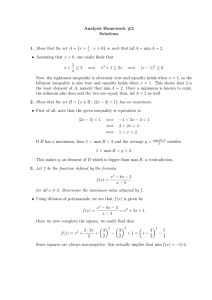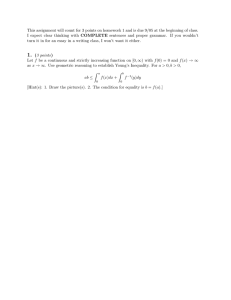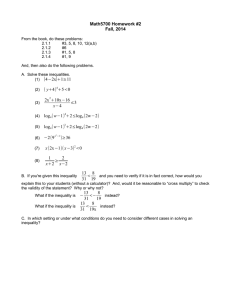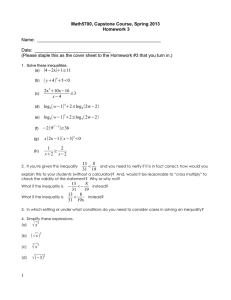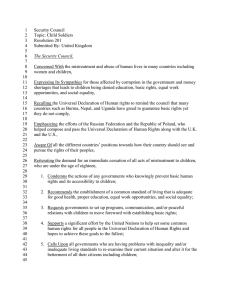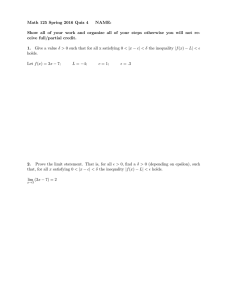Social Inequality, Moral Implications, and Questions for Public Policy Bassey Ubong
advertisement
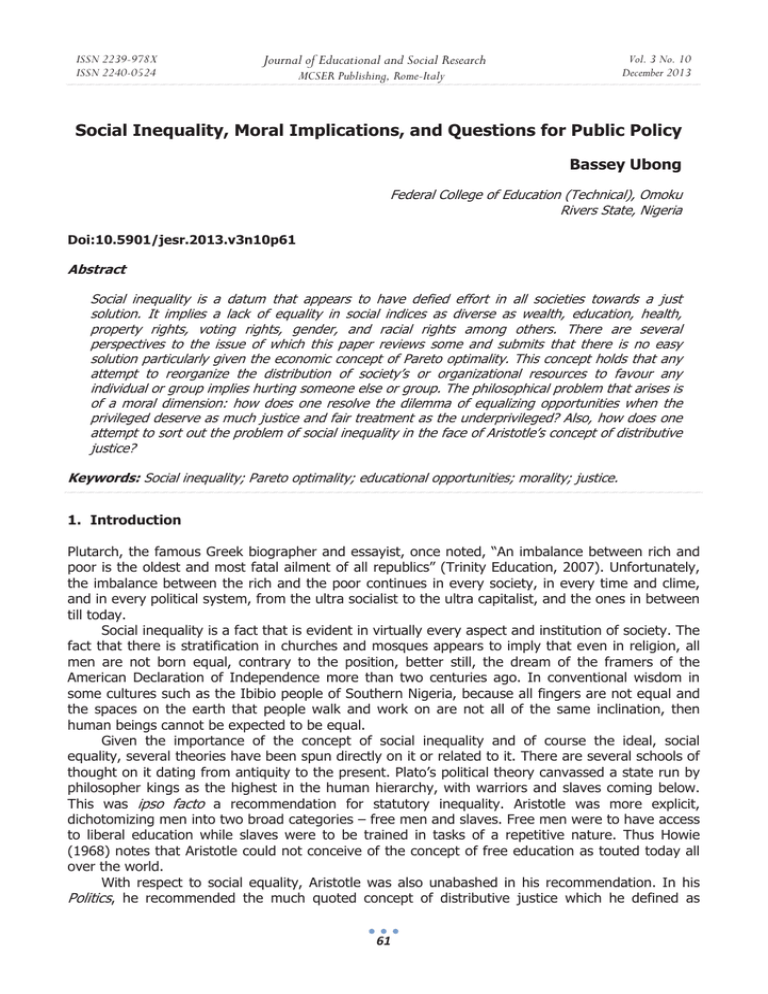
ISSN 2239-978X
ISSN 2240-0524
Journal of Educational and Social Research
Vol. 3 No. 10
December 2013
MCSER Publishing, Rome-Italy
Social Inequality, Moral Implications, and Questions for Public Policy
Bassey Ubong
Federal College of Education (Technical), Omoku
Rivers State, Nigeria
Doi:10.5901/jesr.2013.v3n10p61
Abstract
Social inequality is a datum that appears to have defied effort in all societies towards a just
solution. It implies a lack of equality in social indices as diverse as wealth, education, health,
property rights, voting rights, gender, and racial rights among others. There are several
perspectives to the issue of which this paper reviews some and submits that there is no easy
solution particularly given the economic concept of Pareto optimality. This concept holds that any
attempt to reorganize the distribution of society’s or organizational resources to favour any
individual or group implies hurting someone else or group. The philosophical problem that arises is
of a moral dimension: how does one resolve the dilemma of equalizing opportunities when the
privileged deserve as much justice and fair treatment as the underprivileged? Also, how does one
attempt to sort out the problem of social inequality in the face of Aristotle’s concept of distributive
justice?
Keywords: Social inequality; Pareto optimality; educational opportunities; morality; justice.
1. Introduction
Plutarch, the famous Greek biographer and essayist, once noted, “An imbalance between rich and
poor is the oldest and most fatal ailment of all republics” (Trinity Education, 2007). Unfortunately,
the imbalance between the rich and the poor continues in every society, in every time and clime,
and in every political system, from the ultra socialist to the ultra capitalist, and the ones in between
till today.
Social inequality is a fact that is evident in virtually every aspect and institution of society. The
fact that there is stratification in churches and mosques appears to imply that even in religion, all
men are not born equal, contrary to the position, better still, the dream of the framers of the
American Declaration of Independence more than two centuries ago. In conventional wisdom in
some cultures such as the Ibibio people of Southern Nigeria, because all fingers are not equal and
the spaces on the earth that people walk and work on are not all of the same inclination, then
human beings cannot be expected to be equal.
Given the importance of the concept of social inequality and of course the ideal, social
equality, several theories have been spun directly on it or related to it. There are several schools of
thought on it dating from antiquity to the present. Plato’s political theory canvassed a state run by
philosopher kings as the highest in the human hierarchy, with warriors and slaves coming below.
This was ipso facto a recommendation for statutory inequality. Aristotle was more explicit,
dichotomizing men into two broad categories – free men and slaves. Free men were to have access
to liberal education while slaves were to be trained in tasks of a repetitive nature. Thus Howie
(1968) notes that Aristotle could not conceive of the concept of free education as touted today all
over the world.
With respect to social equality, Aristotle was also unabashed in his recommendation. In his
Politics, he recommended the much quoted concept of distributive justice which he defined as
61
ISSN 2239-978X
ISSN 2240-0524
Journal of Educational and Social Research
MCSER Publishing, Rome-Italy
Vol. 3 No. 10
December 2013
“equality for equals and inequality for unequals” (Howie, p.29).
Theories and schools of thought that deal directly on social inequality range from the
economic perspective as typified by the Marxian dialectic that led to socialism, the ethical
dimension such as extreme individualism, to the utilitarian, the latter of which would want to see all
human beings on the same level where moral action should aim at the greatest good for the
greatest number.
Given the plethora of theories and schools of thought as well as the din that usually follows
discussion on social equality, a middle of the road (though still contentious option) is perhaps safer.
This middle of the road position is what Benn and Peters (1958) in Adewole (1999) refer to as
“equal consideration.” This principle ameliorates Aristotle’s distributive justice by holding that
people should be differentially treated if there are “relevant grounds” to do so. For instance, it
would amount to injustice to put autistic children in a regular class; in which case, unequal
educational opportunity becomes a positive policy if adopted. The only problem there is the
possibility of abuse given the subjectivity that goes with who, what, where, and how “relevant
grounds” are determined.
Equality of all persons could have been an interesting public policy to pursue. However there
is veritable inequality in natural endowments from the biological and environmental to the
psychological and intellectual. Such differential endowments necessarily lead in a number of cases
to achievements that put some people above others. Not every person can make people laugh and
make money out of it. Not every person can identify a business opportunity and turn it into a
multinational. Thus Mr. Ted Turner took over a failed enterprise and turned it into the world’s first
and to date widest covering 24-hour news organization. This is the stuff of entrepreneurship which
is verily a rare gift to human beings.
If certain human beings have taken certain actions and certain positive results are recorded
say, in pecuniary terms, is it right to deny them the benefit of their enterprise or natural
endowment? Should public policy distribute private wealth to every person in the society including
those that have a personal disposition or predilection for laziness? This is where not only
distributive justice comes into play but also the economic concept of Pareto optimality which
reminds all that in an attempt to redistribute a quantum of wealth, a Peter must be robbed to pay a
Paul. The privileged has as much right to the benefits of effort and risk taking as the
underprivileged has a right to a descent living. It is thus the headache of those in positions of
authority to either create extra wealth to accommodate the less privileged or let sleeping dogs lie.
Though not openly declared, this might be at the heart of the current debate in the United States
over the propriety or otherwise of the ‘Obamacare.’
2. Social Inequality
Preston (1992) defines social inequality as “the expression of lack of access to housing, health care,
education, employment opportunities, politics, and status. It is the exclusion of people from full and
equal participation in what we, the members of society, perceive as being valuable, important,
personally worthwhile and socially desirable.” This also shows that social inequality is
multidimensional and as Grusky (2001) notes, is different from economic inequality which refers to
unequal distribution of wealth. Economic inequality is actually what mainly generates the other
forms of inequality.
Aminigo (1999) looks at equality per se rather than a negation of it. To him, equality could be
seen from the mathematical sense of sameness as well as from the moral sense of impartiality. He
quotes Lucas (1965) who sees the concept of equality from some perspectives including “legal
equality” and “formal equality.” Legal equality refers to “a provision whereby men may secure
equal treatment in some aspects at the cost of necessarily not securing equal treatment in all
respects” (p. 42) as for instance, the poor not being fined the same as the rich for an equivalent
offence and for that matter, the rich paying a higher tax or levy than the poor.
62
ISSN 2239-978X
ISSN 2240-0524
Journal of Educational and Social Research
MCSER Publishing, Rome-Italy
Vol. 3 No. 10
December 2013
In formal equality, Lucas (1965) in Aminigo (1999) refers to the principle of universality in
which he argues that “if two people are being treated, or are to be treated differently, there should
be some relevant difference between them” (p.41). In which case, there must be grounds for
differential treatment of people, an idea which in essence is a re-echo of Aristotle’s principle of
distributive justice which holds that it is as unjust to treat equals unequally as it is to treat unequals
equally. Okoh (2003) describes this as universal or procedural equality.
Aminigo (1999) on reviewing the myriad perspectives of the concept of equality (which is the
opposite of inequality, the former an ideal social state), submits that equality is basically a positive
concept rooted in morality and justice, of which morality and justice are ethical constructs that
determine human behaviour and treatment of people in a society. He favours the position of Lucas
(1965) that unequal persons should be treated unequally if there are grounds to do so.
Benn and Peters (1958) as quoted by Adewole (1999) are on the same wavelength as Lucas.
They propose that “the only universal right, it has been said, is the right to equal consideration”
(p.18).This is verily Aristotle’s theory of distributive justice which specifies that people should be
treated differently if there are relevant grounds to do so. Adewole (1999) however criticizes the
principle based on who determines “relevant grounds” and what such would be. Where there is
such latitude, those at the giving or determining end could abuse the privilege to the detriment of
those to be judged or those at the receiving end as for instance, the less privileged.
The Arusha Declaration of the principles of state is based on the principles of social justice.
Crafted in Tanzania in 1967 by President Julius Nyerere, the concept of Ujaama was based on
socialist principles. The document states among other things, “The basis of socialism is a belief in
the oneness of man and the common historical destiny of mankind. Its basis, in other words, is
human equality.” The policy planned for collectives run by the members that were in the
programme by voluntary participation. The socialist experiment in Tanzania was not a success but
the principle is what is of essence in this context.
3. Some Perspectives of Social Inequality
There are several angles from which the concept of social inequality can be viewed. These include
political, economic, and social philosophies as well as related issues. Some of these vistas are
reviewed under.
Social Darwinism - This school of thought flowered on the findings of biological
experiments by naturalist Charles Darwin who came up with the theory of natural selection by way
of competition of species such that the fittest survived while the weak were eliminated. The school
of thought favoured laissez-faire political philosophy and capitalism. However because of extreme
application by Nazi Germany by way of eugenics (superiority of a race) social Darwinism waned in
popularity in the 1940s.
Social Darwinism as a theory is relevant to social inequality in that it simply implies that those
not favoured in the society are weak and therefore should either be eliminated or stay at the lower
rungs of the ladder. The theory is not even applied in its quintessential form in the world’s number
one democracy, the United States of America (USA). Despite extolling capitalism and to some
extent egoism, the American system provides “safety nets” for those that are unable for one reason
or the other (including mental or physical incapacitation) to compete favourably in the society for
material and other resources that promote well-being. Welfare or the dole in which the jobless are
given food stamps or minimum wage to afford them a descent standard of living is a safety net
which most countries do not have. The unfortunate and acerbic exchanges in the process of
legislating on the Health Care Bill in 2010 should not be seen as a vote for quintessential social
Darwinism.
Naturalism - American philosophers John Dewey and George Santayana are proponents of
the naturalist philosophy which holds that nature is the ultimate reality and it can be understood
through scientific investigation. Naturalists do not discount the role of the transcendent, but they
63
ISSN 2239-978X
ISSN 2240-0524
Journal of Educational and Social Research
MCSER Publishing, Rome-Italy
Vol. 3 No. 10
December 2013
discount its value since it cannot be understood (because it cannot be justified or verified). This
theory is therefore anti-determinism; it is more pro-existentialism. The implication in the context of
this paper is that no one is condemned by nature to functioning at the lower rungs of the ladder;
social mobility is real and practical.
This indeed is the substance of the famed American Dream that holds that the society should
be positioned to allow all members to climb the socio-economic ladder to the highest level, an
epitome being the current case of Mr. Barack Obama who is the first African American and first
minority to become the President of the USA after more than two centuries of the Declaration of
Independence. The Declaration stated among other beautiful provisions and beliefs, “We hold
these truths to be self-evident, that all men are created equal, that they are endowed by their
Creator with certain unalienable Rights, that among these are Life, Liberty, and the pursuit of
Happiness…”
Utilitarianism - Hook (2006) states that “the term utilitarianism is more specifically applied
to the proposition that the supreme objective of moral action is the achievement of the greatest
happiness for the greatest number. This objective is also considered the aim of all legislation and is
the ultimate criterion of all social institutions.” If the principle is to cover legislation and all social
institutions, it is as good as saying that every aspect of life in the society is covered.
Classical utilitarianism associated with Jeremy Bentham and John Stuart Mill “judges actions
to be good or bad, right or wrong on the basis of their consequences for the people affected by
them” (Beck, 1972, p.87). The other critical perspective of utilitarianism is its dualism as noted by
Beck (1972). This implies maximization of happiness and maximization of benefit to the population,
the majority rather than the individual as canvassed by egoism (altruism canvasses a focus on
utility for the individual without hurting the larger number while egoism roots for the individual
specifically).
The implication of utilitarianism, which is akin to pragmatism in epistemology, is that public
policy or group action should aim at the benefit for the majority. In a society where public policy
evidently creates almost insurmountable social strata cannot be said to be utilitarian in philosophy.
For instance, setting up private universities – as well as academic institutions at the lower levels –
which are for the super rich, are not utilitarian. These institutions exacerbate social gaps as conflict
theories hold. As to whether the quintessential form of utilitarianism is actionable in real life
situations is the subject of the critiques of the concept.
Social Inequality and Sociology of Education Theories - Marshall (1998) indicates that
sociology of education “is the study of how public institutions and individual experiences affect
education and its outcomes.” Some of the purposes of education are also advanced as:
i) A means of overcoming handicaps, achieving greater equality and acquiring wealth and
status (Schofield, 1999).
ii) A forum for children to develop according to their unique needs and potentials (Schofield,
1999)
iii) A means for achieving greater social equality (Sargent, 1994).
Does education generally lead to achievement of social equality? Put another way, does
education lead to reduction or elimination of social inequalities in societies? Two sociology of
education theories attempt to give answers to these questions that are practical problems in
virtually every society of the world.
Structural functionalism advances the idea that societies tend to work towards equilibrium and
social order using institutions and processes, one of which is education. Schooling is a process of
socialization and it supports continuity and therefore social order. Because schools use middle class
experiences that “cool out” working class children, the latter end up with lower qualifications and
lower rewards. The educational system is actually designed to sort people out and place them and
as Connell and White (1989) submit, “Education achieves its purpose by maintaining the status
quo, where lower class children become lower class adults, and middle and upper class children
become middle and upper class adults.”
64
ISSN 2239-978X
ISSN 2240-0524
Journal of Educational and Social Research
MCSER Publishing, Rome-Italy
Vol. 3 No. 10
December 2013
Conflict theorists do not subscribe to the social order idea, believing rather that the society is
full of vying social groups with different aspirations and different access to life’s chances, each
securing rewards differentially. Education is controlled by elites whose purpose is to reproduce
existing inequalities (Furze & Healy, 1997) sometimes by way of the ‘hidden curriculum’ (Harper,
1997). Sargent (1994) therefore submits that education as provided and controlled by the
dominant group perpetuates the myth that education is available to all for the purpose of achieving
wealth and status and therefore equality. Whoever does not avail himself or herself of the
opportunity should blame self rather than the society. In essence, western education may provide a
forum for all to achieve the equivalent of the “American Dream” but it is primarily structured to
keep people in their existing positions, that is, to perpetuate and reproduce the status quo.
4. Social Inequality: The Case of Educational Opportunities
Fafunwa (1999) discusses the concept of equality of educational opportunities in the context of
social justice. An international confrontation of the problem of inequality in educational
opportunities which to a large extent determines the rest of what life is in the context of the
modern world came through the United Nations Universal Declaration of Human Rights in 1948.
This declaration guarantees right to equal education for all human beings.
Legal positivists view the concept of rights from the perspective of fundamental personal
rights found in law. The only problem with human rights and therefore equality of persons is that
there is a palpable difficulty associated with enforcement. Thus for instance, universal, compulsory
education remains unattainable at least in the Nigerian society in spite of the fact that basic
education is regarded by the UN as human right.
With specific reference to equal educational opportunities, Husen (1972) highlights three
perspectives as follows:
i) To start education on equal footing as in every child starting from Primary 1 or Nursery 1.
ii) To receive equal treatment during education irrespective of genetic differences, family
background, or social origin.
iii) To have equal opportunity to succeed in and through education, implying equivalent
examinations and securing employment thereafter.
Nevertheless when one remembers that there are natural situations that call for unequal
treatment of people (as in the case of children that are physically and mentally challenged), then
the idea of equal consideration may not be completely thrown overboard. After all, providing a
separate school for education of what are in actuality autistic cases would amount to equal access
to education.
Gamoran (2002) draws attention to the fact that although streaming in schools is usually
criticized, absence of it has problems of its own. He states, “Although setting and streaming are
commonly associated with segregation and achievement of inequality, the absence of these
practices (detracking or mixed-ability grouping) has problems of its own.” One of the problems is
that teachers tend to lower standards so as to accommodate lower achieving students (Gamoran &
Weinstein, 1998). Achieving equality in educational opportunities is at the end of the day, as much
a task as managing criticisms associated with practices that smack of inequality.
5. Contemporary Developments
Grusky (2001) notes that “The social roles in society are first matched to ‘reward packages’ of
unequal value, and individual members of society are then allocated to the positions so defined and
rewarded.” It is the reward packages that are not only extending the gap between the super rich
and the rest of the world but distending the anger of the underprivileged as they watch their
standard of living slide with the years.
Auken (2008) indicates that the world’s 1,100 richest people (Forbes 2010 billionaires list) had
65
ISSN 2239-978X
ISSN 2240-0524
Journal of Educational and Social Research
MCSER Publishing, Rome-Italy
Vol. 3 No. 10
December 2013
almost twice the assets of the poorest 2.5 billion people in 2008. The 2.5 billion people, making up
40% of the world’s population, lived on less than $2 per day. In a Financial Times of London/Harris
poll conducted in 2008, public anger was evident across selected countries of Europe as well as
China and the USA. Auken (2008) reporting on the result of the poll noted the growing anger over
social inequality in the countries surveyed. 76% of people surveyed in Spain, 87% of people in
Germany, 80% of people in China, and 76% of the people surveyed in the USA worried that
inequalities are increasing in their countries and that the rate will be faster in the coming years.
With rising food prices, the situation is direr in all countries of the world but as usual, more so in
developing countries, a situation that has led to violence and public uprising (Ubong, Oguzor, &
Wokocha, 2009).
The case of China is particularly interesting given the fact that it is essentially a socialist state.
With acceptance of limited capitalism, the country has seen the emergence of billionaires that
compete favourably with others in the Forbes list. In the 2013 Fobes List, China had the highest
number of billionaires (122) after USA (442) in the world. However, the workers are traumatized
with low incomes and poor working conditions including lack of control of the means of production,
a central theme in socialist ideology. The case of Foxconn, a Taiwanese company based in China
has been controversial because of suicides of staff. In 2010 alone, there were 13 suicide attempts
while 10 staff have succeeded in taking their lives. Chan (2010) notes that Foxconn manufacturing
facility, in spite of employing 800, 000 workers and producing high technology gadgets such as
iPod, iPads and components or finished products under an outsourcing arrangement for giants such
as Apple, Dell, Hewlett Packard, and Sony, is no more than a sweatshop reminiscent of the
beginnings of the Industrial Revolution in Britain.
Some societies appear to be far more steeped than others in social inequality because of their
history. For instance the Australian society is said to have been founded on inequality (Ling, 2009).
Australia has a past of apartheid and there is “unbridled, all-consuming capitalism” in which the top
20% control 40% of national income. South Africa has an equivalent history and is struggling, to
date with minimal success, to come out of it. Brown II (2004) states:
Today in South Africa, any visitor can note the salience of the stark inequality that exists. The
ride from the airport to the beauty of the inner city shows the unsuspecting foreigner the grim
reality of life in the townships up close and personal. Before reaching the breathtaking waterfront
or Table Mountain, it is implausible that anyone could miss the presence of street children begging
for food.
The situation in the world’s most populous black nation – Nigeria – is not different. The United
Nations Children’s Fund (UNICEF, 2005) indicates that between 1993 and 2003, the lowest 40% of
Nigeria’s population controlled just 13% of the national income while the highest 20% controlled
56% within the same period. With members of the National Assembly coasting home with average
pay packet of 10 million Naira (about $65, 000.00) a month, the gap has definitely widened by
now.
6. A Case Study - Social Inequality in Nigeria
As an official or public policy concept, social inequality can be reviewed from two perspectives
among others – the Federal Constitution and the National Policy on Education (NPE). The 1999
Federal Constitution at least in theory has a number of provisions that are geared towards
eliminating (not reducing) social inequality. It commences with an array of Fundamental Rights,
Nigeria’s version of American or French Bill of Rights: right to life, dignity of the human person;
personal liberty; fair hearing; private and family life; freedom of thought, conscience and religion;
freedom of expression and the press; peaceful assembly and association; freedom of movement;
freedom from discrimination; acquisition and ownership of immovable property anywhere.
Chapter II of the Constitution that deals on Fundamental Objectives and Directive Principles of
State Policy, Section 14 (1) states, “The Federal Republic of Nigeria shall be a State based on the
66
ISSN 2239-978X
ISSN 2240-0524
Journal of Educational and Social Research
MCSER Publishing, Rome-Italy
Vol. 3 No. 10
December 2013
principles of democracy and social justice” (p.10) and Section 14 (3) and (4) analyze the principle
of federal character aimed at ensuring equity in the distribution of the commonweal without bias,
implying a drive to eliminate all forms of inequality among the citizens. Section 16 (2)(c) under
“Economic Objectives” indicates that “the economic system is not operated in such a manner as to
permit the concentration of wealth or the means of production and exchange in the hands of few
individuals or of a group” (p.11). Unfortunately as noted earlier in a UNICEF data, much of the
nation’s wealth is concentrated in a few hands.
On “Social Objectives,” Section 17 declares unabashedly, “The State’s social order is founded
on the ideals of Freedom, Equality, and Justice” and sub-section (2) (a) states that “every citizen
shall have equality of rights, obligations, and opportunities before the law” (p.12). The good thing
is that the word ideal is used, which implies that the framers of the Constitution were aware of the
utopian nature of the provisions, for up to now, Nigerian rulers have met most of the equality
provisions in the breach.
The “Educational Objectives” are listed in Section 18 and the Constitution indicates in Section
18 (1) that “Government shall direct its policy towards ensuring that there are equal and adequate
educational opportunities at all levels” (p.13). The lack of firmness and commitment in that
provision is apparent and underlies the provision for free education at all levels provided in Subsection (3) (a-d).
The National Policy on Education (FRN, 2004) echoes the dreams of the framers of the
Constitution by providing for free, universal, and compulsory education at all levels. Section 1 (c)
declares, “every Nigerian child shall have a right to equal educational opportunities irrespective of
any real or imagined disabilities each according to his or her ability” (p.7). This is a most interesting
provision not only because it verily waters down the proposition of equal educational opportunities
but because it reminds one of the position of Benn and Peters (1958) as quoted by Adewole
(1999). The writers propose that “the only universal right, it has been said, is the right to equal
consideration” (p.18).The principle aligns with Aristotle’s theory of distributive justice and “relevant
grounds” for unequal treatment of people as advanced by Peters (1970) as quoted by Aminigo
(1999). Peters (1970) emphasizes that effort can be made to identify similarities in characteristics
in man qua man whereon equal treatment can be applied. Outside this, argument on equality of
men appears to be vacuous.
7. Consequences of Social Inequality
One of the consequences of social inequality could be social unrest or outright violence. In an
interview in the programme Connect the World in Cable News Network (CNN, 2009) a former Vice
President of Costa Rica, Kevin Casas-Zamora stated that there is “empirical correlation between
huge unequal distribution of wealth and level of violence” in a country. The implication is that social
inequality is a tinderbox that any wise government should be conscious of.
There is no doubt that on a general note, social inequality has an impact on self-concept and
future achievements particularly of young people. A 1979 Carnegie study titled "Small Futures:
Children, Inequality, and the Limits of Liberal Reform" by Richard de Lone found that a child's
future is largely determined by social status, not brains. The study notes the case of two boys,
Bobby and Jimmy, two second-graders, who pay attention in the classroom, do well, and have
nearly identical intelligent quotients. Bobby is the son of a successful lawyer while Jimmy works
infrequently as custodial assistant. Despite their similarities, the difference in the circumstances to
which they were born makes it 27 times more likely that Bobby will get a job that by time he is in
late 40s will pay him an income in the top ten bracket of all incomes in the USA. Jimmy had about
one chance in eight of earning even a median income (Trinity Education, 2007). We may not have
witnessed (or we have not studied yet) a link between social inequality and violence in the Nigerian
society but the activities of the so-called militants in the Niger Delta should be seen to portend
what may happen in the future if nothing positive is done at least in the line of equal consideration.
67
ISSN 2239-978X
ISSN 2240-0524
Journal of Educational and Social Research
MCSER Publishing, Rome-Italy
Vol. 3 No. 10
December 2013
8. Schools as Harbingers of Social Inequality
In a society where the dreams of young people are on the average tied to their academic
qualifications, attending a school does not only pre-determine their future prospects but even the
type or name of the school could make a huge difference in determining which job they can aspire
to and how they progress on the career ladder. The present Prime Minister of Britain, Mr. David
Cameron is an Eton product who went on to Oxford for higher education. He started his education
in a private school, Heatherdown Preparatory School, Winkfield, Berkshire, that boasts of Prince
Andrew and Prince Edward as alumni. The Deputy Prime Minister, Mr. Nick Clegg attended Caldicott
School, South Buckinghamshire and the Westminster School, London, both private schools, before
going on to Cambridge for his degree.
Although graduation from an Ivy League school is certainly not a guarantee for a top job
including a high political office, it is certainly an advantage (Mr. Cameron is said to surround
himself with several Eton graduates). One should expect recruiters and voters to feel a bit
intimidated by the alma mater of some persons before them and so would recruit or vote on the
understanding that a product of a certain institution should, ceteris paribus, perform well in
organizational setting or public office. This might explain why parents pay huge amounts of money
to send their children to selected private schools. In Britain, the Mail (2007) noted that as at 2007,
rising school fees in private schools were threatening to keep middle-class parents away from such
schools, which means possibly keeping their children at the middle class level. The fees were as
high as £16, 000 (day) and about £25, 000 (boarding), with Eton posting the highest level of £24,
990.
It is such fear that apparently informed an extensive study by the United Nations Educational,
Scientific, and Cultural Organization (UNESCO) on social inequality in schools. The report states in
its opening statements, that equality in schools “becomes the aim pursued with a view to ensuring
equality of opportunity in access to various social positions, in particular, that elites are established
on democratic principles” (Duru-Bellat, 2004, p.19). Although the last few words are an admission
that schools are capable of creating ‘elites,’ the author would want such inequality-generating
situation to be done democratically. The submissions of the study confirm the position of conflict
theorists that schools are nurseries for determining status throughout life and that entry status is
sustained at the end of schooling (low status children end up as low status adults and so on).
9. The Way Forward
Galbraith (1964) notes that “one senses a growing recognition that social justice is indispensable
for social progress” (p. 22). However, it does appear there is no easy way out of the problem of
social inequality that is often a negation of social justice. If things are left as they are (in Adam
Smith’s invisible hand theory), crooked things never appear to right themselves. If there is
deliberate intervention, problems arise because of the conflict between insufficiency of resources to
meet the needs of everybody and the fact that even the socially well placed are citizens that have a
right to protection of their way of life. After all, under normal circumstances, they pay the big
taxes.
Of consuming interest is the economist’s theory of allocation of resources described as Pareto
optimality. Economic theory is greatly concerned with functional distribution of income and income
is a strong index of social equality. Lipsey (1983) posed the following questions:
Are the poor getting poorer and the rich richer, as Karl Marx thought they would? Are the rich
getting relatively poorer and the poor relatively richer, as Alfred Marshall hoped they would? Is the
inequality of income a social constant, determined by forces possibly beyond man’s understanding
and probably beyond his control, as Vilfredo Pareto thought they were? (p. 349).
Pareto’s optimality has to do with allocative efficiency in an economy. The understanding is
that resources are limited while uses are unlimited and under such conditions, conscious effort has
68
ISSN 2239-978X
ISSN 2240-0524
Journal of Educational and Social Research
MCSER Publishing, Rome-Italy
Vol. 3 No. 10
December 2013
to be made to share what is available and the sharing has to be done in such a way that there is
optimal use of resources. Samuelson and Nardhaus (1998) state: “Allocative efficiency occurs when
no possible reorganization of production can make anyone better off without making someone else
worse off. Under conditions of allocative efficiency, one person’s satisfaction or utility can be
increased only by lowering someone else’s utility” (p.148).
Vilfredo Pareto, Italian economist, in studying economic efficiency and income distribution
came up with the concept known as Pareto efficiency or Pareto optimality. In a set of allocations to
a set of individuals, efficiency is achieved if reallocation does not lead to one person being worse
off in the process of making another person better off. Where one person or group is better off and
no other person is worse off, or at least the ‘loser’ is neutral, then there is ‘Pareto improvement’
which in real life appears impossible.
An expansion and improvement in the theory was made by Nicholas Kaldor and John Hicks in
what is known as the Kaldor-Hicks criterion or Kaldor-Hicks efficiency. A reallocation of resources
that makes someone better off is justifiable if there is sufficient compensation for the person that is
worse off. This is indeed a utilitarian approach that has made it possible to use cost-benefit
analysis for public projects even in the face of externalities such as environmental problems. Thus a
new airport runway at Heathrow would create new jobs, make airlines more profitable, and make
traveling easier through that airport; however persons that are environmentally conscious and
those living close to the new runway would be negatively affected. Building of dams have met stiff
opposition from China, South Korea to Africa in spite of the potentials even for the people opposing
the plan.
The implication of Pareto optimality is that any effort towards realigning resources to meet
the needs of any individual or group inevitably leads to denying something to another individual or
group. The classic case in Nigerian education is that of quota in admissions. In seeking to even out
or eliminate dominance of some tribal groups in educational attainment particularly at the tertiary
level, quota in admissions is used as a public policy instrument. The moral question that arises is
whether it is fair and just to deliberately deny opportunities to qualified young people from the socalled “educationally advantaged areas” in favour of young people from the “educationally
disadvantaged areas,” of which this later group also needs to be admitted into schools although
they may have lower admission qualifications.
If full equalization of people cannot be attained in any society, perhaps a better approach is to
drastically reduce if not eliminate the extremes of upper and lower classes and encourage if not
deliberately foster the middle class. In the book The Middle Class as a Precondition of a Sustainable
Society, Nikolai Tilkidjiew (2007) observes:
the best political community is formed by citizens of the middle class, and that those states
are likely to be well-administered, in which the middle class is large, and stronger if possible
than both the other classes, or at any rate than either singly; for the addition of the middle
class turns the scale, and prevents either of the extremes from becoming dominant."
How this can be done should be the subject of research agenda starting with philosophers
and then embracing others. A multi-pronged, multi-disciplinary approach is required to tackle the
existential problem of social inequality. Shying away and believing that the society will right itself
amounts to the case of the unwise instinct of the ostrich that hides its head in the sand when
threatened while leaving the other parts of the body at the mercy of powerful predators. Social,
economic, psychological, and even spiritual action can stave off possible crises that may arise in
any society where social inequality is so real and in fact worsening.
10. Conclusion
There is social inequality when individuals in a society are not being treated with “sameness” in
69
ISSN 2239-978X
ISSN 2240-0524
Journal of Educational and Social Research
MCSER Publishing, Rome-Italy
Vol. 3 No. 10
December 2013
several aspects of life. The problem appears to be universal, for it is as relevant to a communist
society as to a capitalist society. The problem is that given the innate and acquired differences
among human beings, treating everybody equally is not really possible. The problem is
compounded by the fact that in a situation of limited resources (which is the case with every
society), redistribution of wealth with allocative efficiency in mind likely leads to one person’s gain
being another person’s loss. The questions that should agitate the mind include: Are there
situations where induced inequality is desirable, as in the case of unequal treatment is education as
a result of natural challenges? Should private schools be abolished given its possible role as
nurseries for cultivation of the elite and perpetuation of social inequality in societies? In the face of
limited resources and the need for allocative efficiency, is it morally right to take from the rich and
give to the poor? Is “equal consideration” an acceptable approach to the issue of social inequality?
Might redistribution of wealth not affect creativity and ultimately societal growth?
References
Adewole, A. 1999. Equality of educational opportunity and its application to the Nigerian system: A
philosophical analysis of its problems and prospects. In Equalization of educational opportunity in
Nigeria. Proceedings of the 13th Annual Congress of the Nigeria Academy of Education, ed. J. A.
Aghenta and T. Ismail, 18. Kongo-Zaria: Tamaza Publishing Company.
Aminigo, I. M. 1999. A direct introduction to educational philosophy. Port Harcourt: Hanging Gardens
Publishers
Auken, B. V. 2008. Global survey reveals growing anger over social inequality. http://www.wsws.org
/articles/2008/May2008/ineq-m20.shtml
Baike, A. 1999. Keynote address on equalization of educational opportunity in Nigeria. In In Equalization
of educational opportunity in Nigeria. Proceedings of the 13th Annual Congress of the Nigeria
Academy of Education, op. cit., xiv-xxvii.
Beck, C. 1972. Ethics: An introduction. Toronto: McGraw-Hill Ryerson Limited.
Benn, S. I., & Peters, R. S. 1959. Social principles and the democratic state. London: Allen and Unwin.
Brown II, M. 2004. Social inequality in South Africa: At what price? http://www.stanford.edu/jbaugh/saw/MichaelSociaInequality.html
Casas-Zamora, K. (Speaker). 2010. Connect the world [Television series episode]. B. Anderson, Producer.
New York: Cable News Network.
Chan, J. 2010. Foxconn suicides highlight China’s sweatshop conditions. http://www.wsws.org
/articles/jun2010/foxc-j03.shtml
Connell, R. W., and White, V. 1989. Child poverty and educational action. In Child poverty, ed. D. Edgar,
D. Keane, and P. McDonald. Sydney: Allen & Unwin.
Duru-Bellat, M. 2004. Social inequality at school and educational policies. UNESCO Institute for
Educational Planning.http://unesdoc.unesco.org/images/001362/136282.pdf
Fafunwa, A. B. 1999. Perspectives of equalization of educational opportunity in Nigeria: Philosophical,
historical, psychological, and sociological aspects. In Equalization of educational opportunity in
Nigeria. Proceedings of the 13th Annual Congress of the Nigeria Academy of Education, op. cit., 316).
Federal Republic of Nigeria. 1999. Constitution of the Federal Republic of Nigeria 1999. Apapa, Lagos:
Federal Government Press.
Federal Republic of Nigeria. 2004. National policy on education. Apapa, Lagos: NERDC Press.
Furze, B., and Healy, P. 1997. Understanding society and change. In Society and change, ed. C.
Standfford and B. Furze, 2nd. ed. Melbourne: Macmillan Education Australia.
Gamoran, A., and Weinstein, M. 1998. Differentiation and opportunity in restructured schools. American
Journal of Education. 106. 385-415.
Gamoran, A. 2002. Standards, inequality, and ability grouping in http://www.ces.ed.ac.uk/pdf%20files
/Broef025.pdf
Galbraith, J. K. 1964. Economic development. Cambridge, Massachusetts: Harvard University Press.
Grusky, D. B. 2001. The past, present and future of social inequality. In Social stratification: Class, race,
70
ISSN 2239-978X
ISSN 2240-0524
Journal of Educational and Social Research
MCSER Publishing, Rome-Italy
Vol. 3 No. 10
December 2013
and gender, ed. D. B. Grusky. Colorado: Westview Press.
Harper, G. 1997. Society, culture, socialization, and the individual. In Society and change op. cit.
Hook, S. 2006. Utilitarianism. Encarta Encyclopedia (Computer Software). Albuquerque: Microsoft
Corporation.
Howie, G. 1968. Aristotle on education. London & New York: Collier-Macmillan Ltd and The Macmillan
Company.
Koster, O. 2007. Soaring fees ‘risk pricing middle-class parents out of private schools.’ The MailOnline.
http://www.dailymail.co.uk/news/article-482400/soaring-fees-risk-pricing-middle-class-parents-outof-private-school.html
Ling, E. 2009. Social inequality in Australia. http://www.ang.com/in/roachworld/Aus3.html
Lipsey, R. G. 1983. An introduction to positive economics. London: The English Language Book Society &
Weidenfeld and Nicholson.
Marshall, G. 1998. Sociology of education. A dictionary of sociology, ed. G. Marshall. Oxford: Oxford
University Press.
Nyerere, J. K. 1967. The Arusha declaration: A declaration outlining Tanzania's policy on socialism and
self-reliance. In Freedom and development. J. K. Nyerere. http://www.ntz.info/gen/n01209.html
Okoh, J. D. 2003. Philosophy of education {the basics}. Port Harcourt: Pearl Publishers.
Omoregbe, J. I. 2001. The human predicament: Has human life on earth any ultimate purpose, any
ultimate meaning? – An existential inquiry. Akoka, Lagos: University of Lagos Press
Peters, R. S. 1966. Ethics and education. London: Routledge & Kegan Paul.
Peters, R. S. 1970. Ethics and education. London: George Allen & Unwin.
Preston, C. 1992. Nagle College, Blacktown South. http://www.ptc.nsw.edu.au/scansw/socineq.html
Samuelson, P. A., and Nordhaus, W. D. 1998. Economics. New Delhi: Tata McGraw-Hill Publishing
Company Ltd.
Sargent, M. 1994. The new sociology for Australians. Melbourne: Longman.
Schofield, K. 1999. The purposes of education. Queensland state education: 2010.
http://www.aspa.asn.au/Papers/eqfinale.pdf.
The Holy Bible. King James Version.
Thompson, A. R. 1981. Education and development in Africa. London: Macmillan
Tilkidjiew, N. 2009. The middle class as a precondition of a sustainable society. http://www.trinity.edu
/~mkearl/strat.html
Trinity Education. 2007. Explorations in social inequality. http://www.trinity.edu/~mkearl/strat.html
Ubong, B., Oguzor, N. S., and Wokocha, A. M. 2009. Educating people for food security to avert food
crisis: The case of Nigeria. Bulgarian Journal of Science and Education Policy (BJSEP). 3, no. 1.17988.
United Nations Children’s Fund. 2005. At a glance Nigeria. http://www.UN&WDR/UNICEF.Statistics.htm
71
